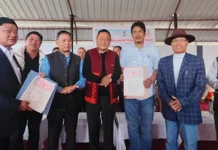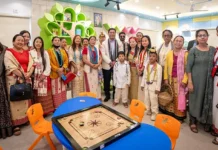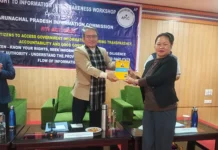[ Bengia Ajum ]
ITANAGAR, 17 Nov: On the occasion of National Press Day, two unsung heroes were recognised by the Arunachal Press Club (APC) and the Arunachal Pradesh Union of Working Journalists (APUWJ). Their names may not be widely known in today’s era of social media, but they have been silently rendering yeoman service in their own ways.
The first unsung hero is Gumin Mize, the founder of the Anti-Drugs Warrior, and the second is the villagers of Kamhua Noknu in Longding district.
During the Covid era, when the whole world was shut down, Mize, who hails from Sibut village in East Siang, had his first closed-door glimpse into the drug world, which changed his life forever.
“I often used to hear about drug abuse problems, but during Covid, when we were all locked at home, I saw drug users in my village creating immense trouble for their families as the supply had dried up. This is when I saw what drug abuse does to families, and this is when I started a movement against drugs,” Mize told this daily.
He said he was deeply humbled to be recognised by the state’s premier media bodies. “This recognition from APC and APUWJ has given me more energy to carry on the fight. I don’t work for awards, and I believe that awards should never be given through political backing,” said Mize.
His constant fight against drug abuse has made him a target of drug suppliers. “I get death threats from the suppliers. And when they can’t scare me, they try to bribe me. I receive huge offers of money from suppliers asking me not to disturb their network.
But I am determined to take the fight against drug abuse to a higher level in the days to come,” he said.
Further, Mize urged the state government to organise awareness programmes on drug abuse on a mass level. “Awareness programmes should be conducted at the ground level. Organising events just to use funds in closed-door settings won’t work. The government should also open more rehab centres with proper facilities,” he added.
Kamhua Noknu village, located in Pongchau circle of Longding district, is a well-known Wancho village. Just a decade ago, it was considered dirty and unhygienic. The villagers, despite the efforts of the administration and student bodies, refused to change their habits and lived in pitiable conditions.
But everything changed in 2017, thanks to the efforts of Jatwang Wangsa and Banwang Losu, local teachers serving at the Government Middle School, Kamhua Noknu. On 15 July, 2017, as part of the school’s weekly social service programme, a cleanliness drive was launched in the village.
Before the campaign began, the villagers had been repeatedly informed to keep their pigs enclosed in bamboo pens and not allow them to wander freely. The teachers made it clear that any pig found roaming in the open would be culled as a strict warning.
“Following this directive, the students chased down and killed four pigs that were found wandering in the village. The carcasses were respectfully handed back to their owners with a message that they were killed for ignoring repeated warnings. Though this action sparked outrage among many elderly villagers who hurled bitter words and even swore that they would ‘die with their pigs,’ the educated youths applauded the bold step,” said Banwang Losu.
He credited the educated village youths for successfully transforming Kamhua Noknu into a clean village.
“The village authorities, such as the chief and GBs, were instigated to punish the teachers and students, but wiser and more educated members stood firm in support of the initiative, understanding its greater purpose. That moment gave momentum to Kamhua Noknu’s cleanliness revolution. Thanks to youth leaders such as Wangchan Losu, Palai Moham, Haiwang Losu, Tonwang Wangham, Khunky Pansa, Langwang Losu, Nokphe Pansa, Heewang Losu, and the entire student community who worked tirelessly to convince every household of the importance of hygiene and sanitation,” he said.
Today, the village is considered one of the cleanest in the state.
“We breathe clean, fresh air, and children play freely on the open ground without fear of filth. The once-foul roads are now safe and pleasant to walk on. The death rate has dropped significantly compared to the years before 2017. Kitchen gardens bloom with vegetables, and vibrant flowers adorn the village during spring. Open defecation is a thing of the past. Hearing the news, our closest neighbouring village, K/Noksa, also adopted the clean model of Kamhua Noknu, and they too are now living hygienic lives. This is how positive impact spreads in a society,” he added.
Visitors from across the world now visit Kamhua Noknu to witness the village’s transformation.





